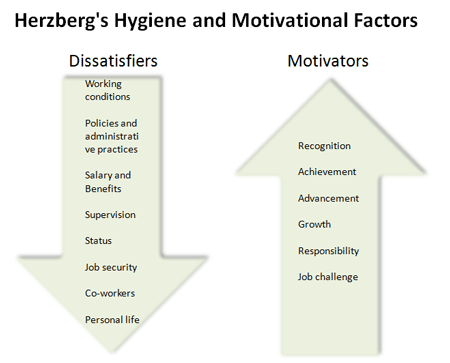Herzberg's Hygiene and Motivational Factors
In 1959, Frederick Herzberg developed a list of factors which were closely based on Maslow's Hierarchy of Needs, except it more closely related to work. Herzberg theorized that hygiene factors must be present in the job before motivators can be used to stimulate the workers:
Hygiene or Dissatisfiers:
- Working conditions
- Policies and administrative practices
- Salary and Benefits
- Supervision
- Status
- Job security
- Fellow workers
- Personal life
Motivators or Satisfiers:
- Recognition
- Achievement
- Advancement
- Growth
- Responsibility
- Job challenge
The Father of "Job Enrichment" and the originator of the "Motivation-Hygiene Theory
Frederick Herzberg was considered one of the most influential management consultants and professors of the modern postwar era. Herzberg was probably best known for his challenging thinking on work and motivation. He was considered both an icon and legend among visionaries such as Abraham Maslow, Peter Drucker, and Douglas MacGregor.
He completed his undergraduate work at CCNY and received his graduate degrees at the University of Pittsburg. Later, he became professor of management at Case Western Reserve University, where he created the Department of Industrial Mental Health. In 1972 he was asked to join the University of Utah's College of Business, then headed by management guru George Odiorne.
In 1995, the International Press announced that his book Work and the Nature of Man was listed as one of the 10 most important books impacting management theory and practice in the 20th century.
He was born in Lynn, Massachusetts on April 18, 1923 and died on January 18, 2000 in Salt Lake City.



